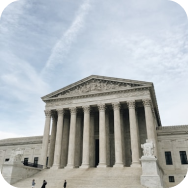Exposing discriminatory laws and regulations to prevent the exclusion of religious organizations and activities from public programs.
The goal of this project is to identify discriminatory laws and regulations to prevent the wrongful exclusion of religious organizations and activities from public programs
The First Amendment’s Free Exercise Clause prevents the government from discriminating against people and groups because of their religious character, commitments, and conduct. The Supreme Court has repeatedly held that all private groups must be allowed fair access to government programs to support common public goals—such as education, poverty alleviation, or healthcare. The government may not discriminate against religious organizations or force them to secularize to participate in programs.
Get the latest news and legal commentary

For over a century, it has been fashionable for government programs to exclude or limit participation by religious institutions. Even when permitted to participate, religious institutions are regularly forced to curtail their activities in order to receive government funding for their charitable healthcare, education and other social services.
Recent Supreme Court rulings have determined that discrimination against religious institutions violates the First Amendment. Yet there are still hundreds of laws and regulations on the books that do so.
The purpose of this website is to help researchers, advocates, and policymakers identify state laws that still violate this bedrock rule. It documents laws that deny religious believers or religious organizations the right to participate in public programs, and which may be unconstitutional as a result. Although we do not express a view on the ultimate constitutionality of any particular law, we hope this repository may be the first step towards identifying — and finally changing — those that do violate the basic First Amendment rights.
When it comes to funding, religion isn’t entitled to more than others, but it also isn’t required to have less. Instead, the goal of this project is to ensure that religious individuals and organizations receive the same government benefits as everyone, irrespective of their faith commitments, so that they can participate fully — just like everyone else — in society.
Excluding religious institutions from government programs isn’t just unfair – it denies the neediest citizens access to the full range services these organizations offer. It means that:
Legal Commentary
Tracking and Ending Religious Discrimination: A new project sponsored by a coalition of organizations seeks to track the various ways that federal and state programs discriminate against religious participants in a range of funding programs despite a series of Supreme Court cases holding such discriminatory treatment unconstitutional. The Religious Discrimination Tracker is a project of the EPIC Coalition (a multi-faith coalition that focuses on education), the Teach Coalition, the Notre Dame Religious Liberty Clinic, and the Notre Dame Educational Law Project. The site seeks to identify ways to ensure equal access to funding by religious participants, particularly in education. In this webinar, Professor Nicole Stelle Garnett (Notre Dame Law) will discuss this new project and expand on her argument in a November 2024 Wall Street Journal op-ed that a range of federal programs “reflect” an outdated understanding of the First Amendment that assumes the Constitution requires the exclusion of religious expression from public life and programs.”
Michael A. Helfand, Are Charter Schools Public Schools? The Question That Has Divided Educators Now Has Religious Implications, JTA News, February 14, 2025
Nicole Stelle Garnett, Tim Rosenberger, Theo Austin, States Discriminate Against Faith-Based Preschools, City Journal, February 14, 2025